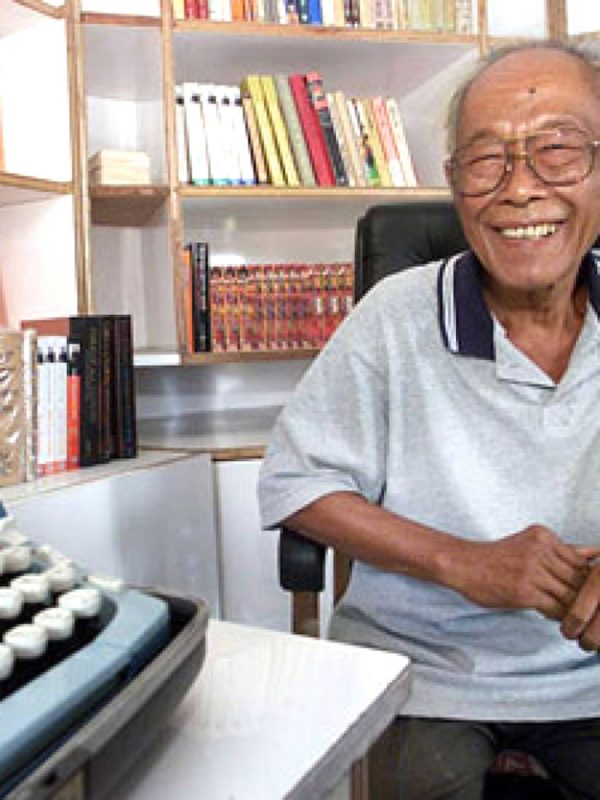
Celebrated Indonesian novelist Pramoedya Ananta Toer. (Darren Whiteside: Reuters)
Sionil Jose’s failed and frankly embarrassing attempt to denigrate journalist Maria Ressa’s Nobel Peace Prize, and his own admission that he actually has been hoping to win the prize himself, reminded me of the novelist who should have been the first Southeast Asian writer to win the Nobel Prize for Literature.
This year marks the 15th death anniversary of Pramoedya Ananta Toer, the brilliant, courageous Indonesian novelist who was nominated repeatedly for the Nobel Prize for Literature. Sadly, he never won. Pramoedya died in 2006.
I first heard of him at UP Diliman in the late 1980s when friends began excitedly talking about an Indonesian writer whose novels mentioned and even paid tribute to the leaders of the Philippine revolutionary struggle against Spain.
That led me to Pramoedya’s novels, led by This Earth of Mankind and A Child of All Nations. I was mesmerized by their power.
The novels tell the story of a 19th century Indonesian journalist and patriot whose involvement in the struggle against Dutch colonial rule was inspired by the 1896 Philippine revolution.
I grew to admire him even more when I learned about the way he wrote his novels. He was arrested and imprisoned after the 1965 coup which gave rise to the Suharto dictatorship. Pramoedya endured a long and brutal imprisonment. A prison officer told him, “The only right you have is to breathe!”
The Suharto regime barred Pramoedya from writing and reading. He was abused and humiliated. But his ordeal didn’t break him. But that didn’t stop him. He could not be silenced.
Imagine being a political prisoner in a remote island where you are constantly brutalized by your captors who tell you that you have no right to think, to reflect, to tell stories. For a writer and artist, that would have meant death.
Pramoedya did not accept that kind of death.
This is the part of Pramoedya’s life that I still feel inspiring and moving to this day: to compose his stories, he secretly narrated the novels to his fellow prisoners. His fellow detainees became his pen and paper. When he found the opportunity to finally write his stories, the detainees helped him recall the tales he told them.
It’s an incredible story of a writer’s insurmountable courage and passion for writing and telling stories.
In 1999, I had an opportunity to meet Pramoedya when he was finally allowed to travel following the fall of Suharto in 1998. But his San Francisco book tour for his memoir, The Mute’s Soliloquy coincided with a reporting trip to Manila — so I was not able to attend.
I missed my chance to meet the writer I had long admired. But a friend did get me a copy of his memoir with Pramoedya’s autograph.
But I had the chance to honor him with my play Pramoedya, which was staged at the Tanghalang Pilipino at the Cultural Center of the Philippines in 2013. My friend, the late activist Susan Quimpo, wrote this moving review.
The play was based on Pramoedya’s novels and on The Mute’s Soliloquy which recalls his incredible ordeal as a political prisoner when he sometimes simply felt like giving up.
“The incentive for life is not so easily dimmed,” Pramoedya writes. “A voice rebels inside me: Just look at you! Not only have you not finished your work, what you have done is shoddy and poor. You lack imagination. You must stay alive! You need another thirty years at the very least. So put up with it and be its witness.”
He was in his fifties when he wrote that. Imprisonment never did break him as he continued writing and telling stories. The New York Times Book Review called The Mute’s Soliloquy a “haunting record of a great writer’s attempt to keep his imagination and his humanity alive.”
Pramoedya was also known for the progressive portrayal of women in his novels, as the renowned scholar Benedict Anderson said in 2017: “Pram was also unique in his literary attachment to women. His work contains many complex portraits of different kinds of women in a manner unmatched by his literary contemporaries, who made men their major fictional figures, with women marginalised as stereotypical mothers, sweethearts, and prostitutes.”
Another respected scholar and academic, my friend Jacqueline Siapno, who got to know Pramoedya, told me: “Pramoedya’s writings have given me so much joy, laughter, strength, hope, and inspiration. He continues to give life to the stories of those who have sacrificed and contributed so much, but have been extrajudicially murdered, assassinated, imprisoned, exiled, disappeared, erased.”
Pramoedya didn’t win the Nobel Prize. But that doesn’t matter. He didn’t need it. He will always be remembered as a courageous, honorable, dignified man of letters, one of Southeast Asia’s greatest novelists.

